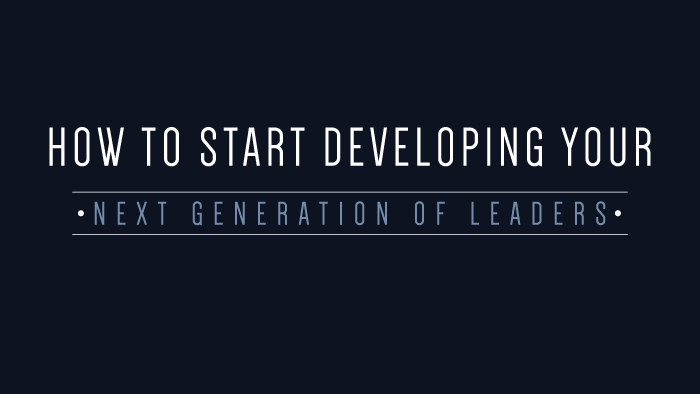Millennial leadership in the workplace is happening now – and will continue to grow as the workforce ages. According to the Pew Research Center, more than a third of Americans in the labor force (35%, or 56 million) are millennials.
While those numbers continue to rise (Inc. says 75% by the end of 2025) and millennials continue to gain experience, organizations must focus on preparing them for leadership.
According to the 2019 Deloitte Global Millennial Survey, 30% of millennials believe that their employer has the greatest responsibility for preparing them for leadership roles, while current leaders say that leadership preparation falls on the individual themselves.
This divide provides a real challenge for organizations – the future of your leadership team depends on your organization meeting the development needs of your high-potential millennial employees.
Ignoring this trend could leave you scrambling when leadership ages out of the workplace because millennials who don’t believe you’re invested in their development are quick to find an employer who will be.
What Millennials Want
Many organizations are still struggling to figure out how they can implement a millennial leadership development plan.
When trying to determine how to cultivate millennials as leaders, you’ll need to understand what millennials want from a workplace and from their current leaders.
Develop a mentorship program
Making connections and networking are important to millennials, so matching them with a mentor is a great way to foster inspiration and engagement. Giving them someone they can go to for feedback or advice can help them make better career decisions moving forward.
There is an added benefit, though, called reverse mentoring. By matching a seasoned employee with a millennial employee, each can learn from the other. These personalized interactions help new employees learn how to add value to organizations, but also allow mentors to practice teaching and coaching with newer employees.
Be a coach
Millennials are not looking for bosses that command, control, or micromanage. They are looking for someone that can coach them, someone that shares their values, someone that values them, and someone that will help build upon their strengths.
Find out what inspires them and what they are passionate about.
Focus on communication
Millennials want to be heard and involved in decision-making. They value transparency and open communication. Allowing them to be part of the conversation and providing them with clear guidelines early on allows them to imagine what roles they could fill in the future.
During new employees’ first week here at BizLibrary, they meet with members of the C-suite and can ask them questions. This demonstrates an openness to communicate and offers transparency right from the start.
Provide feedback and recognition
Annual reviews will slowly fade as millennials prefer feedback on a regular basis.
By offering feedback regularly, millennials will learn accountability and how to better measure success within your organization.
Don’t forget to offer praise or recognition for a job well done. This, too, can help develop habits and skills that make for a great leader.
Remember that one size does not fit all
Flexibility is key when working with this tech-savvy, entrepreneurial generation.
Millennial leaders want to tailor their learning and career paths to what works for them, whether that’s through different learning styles, flexible hours, or work-life balance. As mentioned above, they want to grow through mentorship, but online training is also an important factor in their overall development.
Struggling to cultivate an intentional and successful leadership development program? You’re not alone – learn more about creating a leadership culture that inspires and retains its employees.
How Millennials Learn
Long gone are the days of relying on classroom and lecture-style learning. These digital natives are consuming the content they want, when and how they want it, and at a faster rate than ever before.
The data shows that when millennials want to learn something, there’s one place they’re consistently turning to: the internet.
On YouTube, where the vast majority of users are between the ages of 18-49, videos classified as “how-to” and “educational” both make the top ten most popular types of content.
Millennials live online, and your learning platform should, too. If meeting the learner where they are is a priority for your organization, ignoring this medium could be disastrous for your leadership development initiatives.
Within the digital atmosphere, there are a few more things to understand about how millennials consume and retain information.
- Microlearning: Millennials have fast-working filters for what deserves their attention and what doesn’t, which means companies need to adapt to smaller, bite-sized learning experiences for this generation.
- Experiences: Real-world scenarios, hands-on experience, and working with others will garner interest and help solidify learning.
- Gamification: Gaming is a large part of millennial culture, so adding game elements to your learning and development plans can help keep learners engaged and interested while getting information across.
- Customization: Customizable approaches that allow them to learn at their own pace and according to their own schedule work best.
Millennials consider learning to be essential in their career development.
It’s imperative that companies recognize that as Baby Boomers retire, part of succession planning will be to look toward millennials to fill those roles and leadership positions.
Companies will need to adapt to newer learning strategies to accommodate the changing workforce. Doing so will result in millennials adapting and accepting policies and expectations they can embrace.


